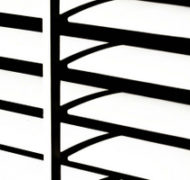Saying Goodbye to Beauty
Blog / Produced by The High Calling
Gwen has been legally blind for ten years. The term “legally blind” needs some explaining. Only about 12% of blind people lack any sight at all. While the legally blind cannot read even the big E at the top of the vision chart, some can count the number of fingers the examiner holds up from several feet away, some can detect movement, while others can only distinguish light from dark.
Gwen is glad she doesn’t fall into either of the latter two categories. She cannot see well enough to drive or read large print. However, she moves around the familiar setting of her house with few problems. “After all, I can see something as big as a chair!” she tells me. “At least most of it.”
Gwen also cooks, though she admits she has mistaken grits for sugar at times and chili powder for cinnamon. And there have been times her earrings or her shoes have not matched. Gwen laughs at these mistakes, however. She even claims that blindness has its advantages.
“I don’t spend nearly as much time worrying about my looks as I used to. I keep my hair cut short so that it’s easy to manage. I rarely wear makeup. When you can’t see yourself, you assume others can’t either,” she says. Her children often warn her about this insouciance.
“Mother,” they say, “just because you can’t see them doesn’t mean they can’t see you.” They are especially horrified when Gwen begins dancing down grocery store aisles to the piped-in music.
“Another advantage to blindness,” Gwen claims, “is it gets you out of some activities you would not want to do anyway. I don’t have to work at the church bazaar, and I get to read while I’m cooking.” By read Gwen means listen. She orders loads of audio material from the Talking Books program of the National Library Service. She has come to prefer listening to visual reading.
There are a few disadvantages to blindness, Gwen admits. She can’t work crossword puzzles by herself. Inability to drive keeps her at home more than she’d like. She’s dependent on others to take her to the grocery store and the pharmacy. This means fitting into other people’s schedules. It doesn’t leave much time for idle browsing in boutiques or hardware stores. But Gwen shrugs this off. “I probably save lots of money that way.”
Then she grows serious. “I remember the autumn day when I was taking my dog for a walk down a country road near my house. I looked across a lovely field where the grass was growing pale gold. I knew it was what we call a beautiful day. But all I could see was a blur of yellow and a smudge of blue sky. All the detail was washed out.”
She pauses to take a deep berth. “That was the day I said goodbye to beauty.”
Of course, Gwen still enjoys the beauty she finds in music, scented candles, and the differing textures of her cat’s fur and the grainy clay she shapes into bowls.
Gwen feels wonderfully grateful that her vision has stabilized over the past few years, thanks to the doctor at the Texas Medical Center everyone calls “the glaucoma guru.” She has learned a lot about the disease and encourages all her family and friends to have their intraocular pressure checked often. “Always ask for the numbers,” she insists. “Don’t be satisfied with ‘normal.’” What was normal didn’t fit her situation, resulting in several years of visual down drift that could have been avoided.
Gwen accepts her loss with what could be called either fatalism or optimism, depending on one’s perspective. “Something happens to everyone eventually,” she shrugs. “This is just what happened to me.”
Every morning when she wakes up, Gwen looks around at familiar objects—her dresser, the overhead fan, a quilt rack—assessing how much she can make out. For the past few years, those objects have retained their misty, truncated shapes. Then Gwen feels a surge of joy. She’s learned to value what remaining sight she has, about 5%, her doctor estimates. “It’s true that you never know what you have till you lose it,” Gwen says. “But what I do have makes so many things still possible. Sighted people may treat vision as ordinary, but to me it’s an extraordinary gift.”
If you could imagine being in Gwen's position, how would your attitude differ?
How does our culture make room for the blind?
Would your work need to change if you began to lose your sight?
Image by Stephen Heron. Used with permission. Sourced via Flickr. Post by Virginia Stem Owens.
Most of the material on The High Calling is available for reuse under a Creative Commons 3.0 license. Unfortunately, work by Virginia Stem Owens is not available for reuse. If you are interested in reprinting work by Virginia Stem Owens, please contact her directly.





